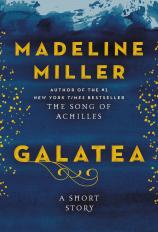Galatea: A Short Story
Review
Galatea: A Short Story
Don’t get too excited, Madeline Miller fans. This is not the longed-for successor to her two fascinating retellings of Greek mythology, THE SONG OF ACHILLES and CIRCE. GALATEA is a little jewel of a hardcover book: midnight blue with gold lettering and stars and pale azure clouds. But it’s just a story, 56 pages in all.
Written in the period between ACHILLES and CIRCE, it was first published in 2013 as an e-book. Not to sound cynical, but its re-release is no doubt timed to coincide with gift-giving season (for $12, it’s a delectable stocking stuffer for the myth lover in your life). Still, I can’t blame Miller for wanting to offer her readers something to tide them over. Her books take time and research; she is hardly the only popular writer to fill in the gaps with prequels, short stories and novellas.
"GALATEA is an intense, rather dark fable of a thwarted mother and a wife both idealized and oppressed. Although hardly as immersive as a full-length novel, it is stunningly effective --- and more important than its size would suggest."
I’m definitely a fan. Decades ago, I first read Mary Renault’s masterful novels set in ancient times (THE KING MUST DIE, THE BULL FROM THE SEAand many others). Ever since, I’ve been looking for another writer who makes these legends seem freshly relevant, and in Miller, I found her.
Her scholarly acumen (she has degrees in Classics and has taught Latin and Greek) gives her books authenticity; her sense of story makes them thrilling. In her telling, heroes and gods are no longer remote figures but touchingly human. In ACHILLES, drawn from the Iliad, she gives Achilles and Patroclus a full-fledged sexual relationship. CIRCE, based on the Odyssey, combats the traditional (misogynistic) view of the sorceress with a complex portrait of female growth and power. GALATEA celebrates strong women in a similar way.
In Ovid’s original, as Miller reminds us in a new afterword, the goddess of love turns a statue into a human woman, and she and her adoring sculptor, Pygmalion, live happily ever after. When I read the story as a kid, in a children’s edition, I was enraptured by the magic of the transformation. I didn’t notice that the statue herself was entirely passive, a man’s creation.
Miller noticed. Her story begins 11 years after Galatea has undergone the metamorphosis. Hers is not a happy marriage. Her husband is repulsive and violently possessive, one of those men, Miller writes, “who react with horror and disgust to women’s independence, men who desire women yet hate them, and who take refuge in fantasies of purity and control.” Galatea’s narrative voice --- her true inner self --- is not that of a demure beauty. She’s smart, crafty and courageous, not too dainty for four-letter words. But to survive, she must play-act the obedient wife.
Her great love is her daughter, Paphos, now 10 and educated by a tutor at Galatea’s insistence (she teaches her mother to read and write). An attempt to run away has landed Galatea in a prisonlike institution, unable to see her child. When Pygmalion makes conjugal visits, each time they have sex he insists on a creepy ritual that reenacts the moment of transformation. The very place she’s kept in seems malevolent (“the room swelled around me like a bruise”), her attendants an uneasy mix of solicitous and cruel. Galatea isn’t fazed by her incarceration, though; through boldness and deception, she is determined to find a way out.
GALATEA is an intense, rather dark fable of a thwarted mother and a wife both idealized and oppressed. Although hardly as immersive as a full-length novel, it is stunningly effective --- and more important than its size would suggest. When I think about my own youthful credulousness and the way early reading influenced my sense of self (could I have believed that only men could be artists?), it’s clear that rewriting ancient tales from a feminist perspective isn’t a mere academic exercise. It can change the way girls and women envision their lives.
Reviewed by Katherine B. Weissman on November 18, 2022
Galatea: A Short Story
- Publication Date: November 8, 2022
- Genres: Fiction, Historical Fiction, Short Stories
- Hardcover: 64 pages
- Publisher: Ecco
- ISBN-10: 0063280515
- ISBN-13: 9780063280519




